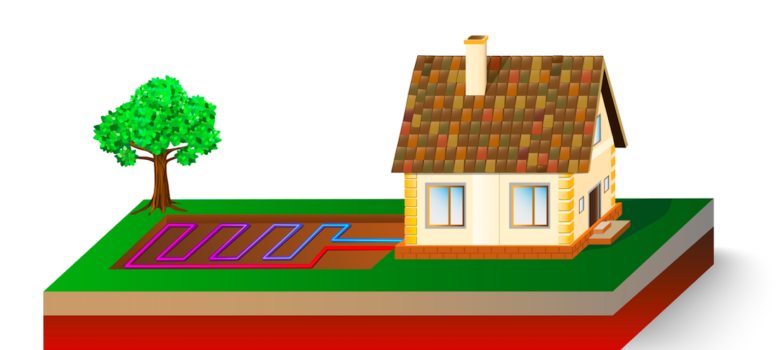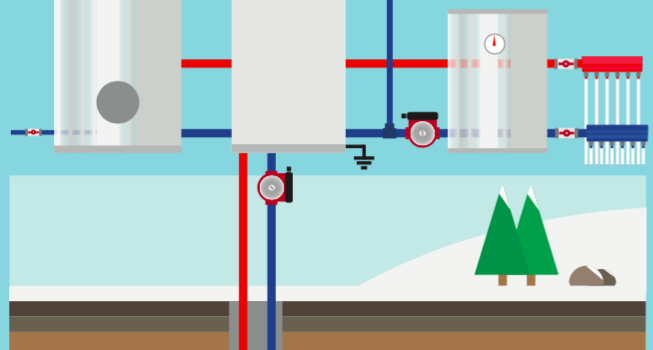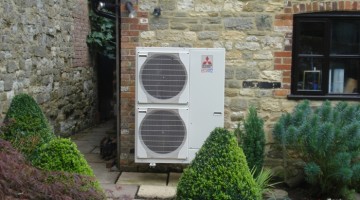
What is a ground source heat pump?
Heat pumps now make up 1% of the UK’s heating systems, and this figure is rising fast. Ground source heat pumps are a green and effective way to provide heating for on and off-grid properties. In essence, it performs the same function as a boiler would in a central heating system, generating heat to be used for heating and water. For those off the gas grid, it’s a much cheaper option than storage heaters or electric radiators – but increasing numbers of people with access to mains gas are also installing the measure.
A heat pump has less environmental impact than other forms of heating such as gas or oil, as no fossil fuels are burned, apart from in generating the electricity that powers the pump. They’re also one of the most efficient ways to heat your home and water.
Although some people are put off by the upfront cost of installation, heat pumps are eligible for government grants under the government Renewable Heat Incentive scheme.
How does a ground source heat pump work?
Put very simply, a ground source heat pump takes heat from below ground and feeds it through a converter to boost its temperature. The heat generated can then be used to provide space or water heating.
Pipes are buried deep in the ground. Heat transfer liquid travels through pipework and absorbs ambient heat from the ground. The liquid passes through a heat exchanger, which removes the heat from the liquid. The heat then goes through a compressor, where it is boosted to a useable temperature. This circuit repeats continuously.
Ground source heat pumps run equally efficiently all year round, unlike air source heat pumps, because the temperature underground remains relatively constant throughout different seasons/weather. The only environmental impact is generating the (relatively small amount of) electricity that powers the pump.
Is my home suitable for a ground source heat pump?
There are several things to take into consideration when thinking about installing a ground source heat pump, so you should always get an expert opinion before making any decisions. Here are some starters:
If you have a mains gas boiler, a heat pump is unlikely to lower your heating costs. If, however, your home is currently heated with oil, LPG or electricity, it could be an option.
For the ground loop, you will need enough space outside for a borehole – and considerably more if your pipework is being laid in trenches. Generally, you’ll need twice the area of the house for the ground arrays.
Ground source heat pumps will work better in new builds/recently-built homes – retrofitting heat pumps in old properties is a challenge. This is because their insulation isn’t normally good enough to keep the house warm with the lower temperature water (than a boiler) generated by a heat pump. GSHPs work best in very well insulated houses with underfloor heating, and perhaps additional over-sized radiators. As well as being potentially uncomfortable, a home that is unsuitable in this way for a GHSP may not be granted planning permission.
Installing a ground source heat pump
First, you have to choose between laying pipes in deep vertical boreholes or shallow horizontal trenches. The main thing that will sway your decision is how much space you have outdoors. You will need a certain amount of pipework in order for the heat pump to work efficiently, and if you can’t go sideways, you’ll have to go down! In one scenario, pipes are laid horizontally in 2-3m-deep trenches over a large surface area to give the heat transfer liquid more chance to pick up as much heat as possible from the ground. Boreholes are drilled down as far as 100m or more, meaning they are much more expensive (but might be the only option in some cases).
The length of the ground loop you need to install depends on how much heat you require (which depends on the size of your home/inhabitants). The longer the loop, the more heat the pipework can draw from the ground, – and the more efficient the system will be – but more digging means more disruption and higher costs.
It’s important to use an MCS-approved installer. If you don’t, you can’t claim RHI payments, and incorrect installation may well affect performance.
Heat pumps are normally under warranty for 10-15 year lifespan, with annual maintenance – but their lifespan should actually be longer.
Ground source heat pump costs
Ground source heat pumps run on electricity, which is more expensive per unit than gas – but don’t let this put you off. They are very efficient. Each unit of electricity (required to run the pump and compressor) turns into 3.5 – 4.5 units of useful heat. To put this into perspective, a brand new ‘energy efficient’ boiler will convert one unit of gas into just 0.9 units of useful heat. So the running costs of this technology are pretty cheap.
Installing a system normally costs £12-20,000 – as mentioned before, costs vary a lot depending on how much digging needs to be done! You can claim back a considerable chunk of this from the RHI. However, because it gives you quarterly payments over 7 years, you’ll still need the initial capital to invest to cover buying it and installation costs.
How much you’ll get in RHI payments depends on a number of factors, including whether or not your house is detached and what heating system you currently have installed. The bigger the increase in efficiency installing a heat pump would have, the bigger the contribution you will get. We’ve done the sums here to give you an idea.
Benefits of a ground source heat pump
- Efficient and cheap to run
- Little maintenance required
- Can provide heat 24/7
- Reduces carbon footprint
- Eligible for RHI payments
Limitations of a ground source heat pump
- You will need a certain amount of outdoor space in order to install the pipework
- Expensive to install
Installing heat pumps
Are you thinking about getting a heat pump? We have scoured the country for the best tradespeople, so that we can make sure we only recommend those we really trust.
If you would like us to find you a local heat pump installer, just fill in the form below and we will be in touch shortly!













I can’t get gas in my house and am glad to find out storage heaters aren’t my only option!!
this geothermal hype can have dire consequences for our groundwater
“…a ground source heat pump takes heat from below ground and feeds it through a converter to boost its temperature.”
Please include a proper explanation. This sentence is nonsense.
Hi Jay,
Essentially the converter takes a large amount of low-level heat, collected by the ground pipes, and compresses it to become a more concentrated, higher heat which you can usefully use. Different converters work in different ways (thus why the phrasing we used is a little vague) but all of them work on this principle.
Thanks,
Harri